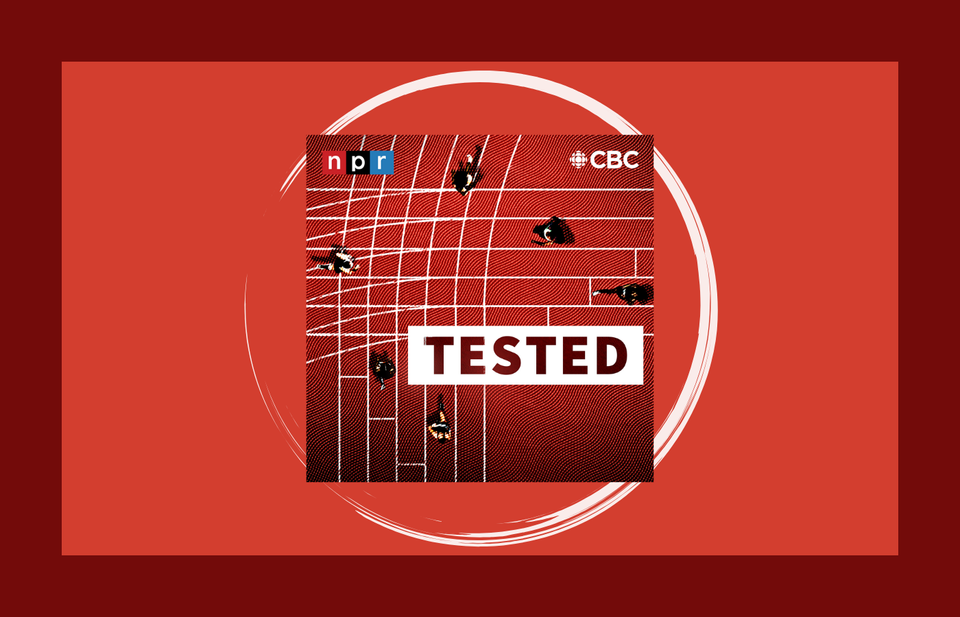Review: Tested

This review was published before the final episode on 7/31/24, and updated after the final episode on 8/1/24.
I’ve been writing and rewriting this review in my head. So we’ll start with the basics, and then move into the story, and then we’ll talk about the why. It’s a little different than my usual reviews, but I think with what I see happening right now - it’s a conversation worth having.
The podcast, Tested is a co-production from NPR, CBC, and Bucket of Eels. It is hosted by Rose Eveleth. Each episode is 30-40 minutes long and crafted beautifully. Tested is a piece of journalism that is high quality, resonant in content, and absolutely infuriating to listen to.
This podcast is infuriating because of the subject matter, not because of the podcast itself. This podcast is fantastic. The audio is neat and clean, the interviews are poignant, and the reporting is thorough. You can tell the team put heart, soul, and respect into this podcast. It’s the subject matter being investigated that creates a spark of anger that slowly melts into rage.
There is a fascination with elite athletes to begin with. We all have a favorite or two, or five. However, there’s also been an obsession with “protecting” women. They can’t compete against men because they are too fragile or because they would never win. While there are real dangers for women and men competing together in certain sports. The obsession with women always seems to be centered around the idea of “enough” good enough, not good enough, or more than enough. So sports bodies responded by creating gender testing, but only for women.
Rose Eveleth takes on the history of gender testing in sport from the beginning to the now. From the triumphs to the heartbreak of being told that you are, but you aren’t a woman. In effect, these athletes are not “woman enough”. This isn’t a question of gender identity. It’s a question of naturally occurring differences, and what the acceptable range of difference is for fairness in sport. It’s a long history of “fairness” questioning. One that at one point subjected women to “nude parades” and issued them a card to prove that they were women.
I participated in sports growing up. I have equally fond and awful memories of being a teenager on a bus, parading around the state to compete against other teenagers. The life of a mediocre sports player in high school is, and was, relatively insignificant in relation to playing the sport. I liked playing the game, but I was, and still am not, someone who particularly cares about winning. This is the difference between me and athletes, especially elite athletes. These are people who care about this sport so much that they give up countless other things for relatively short-term glory. Their lives are this sport. There’s passion we value, a drive we admire, there’s prestige we think fondly on, and then there’s the after.
For a lot of elite athletes the after is a memory, a name on a record sheet, and a listing in history. They become notable in their sport, but maybe not outside of it. For a select few, they become household names. The thing is, in this podcast, we’re not talking about historic, once in a generation athletes like Simone Biles or Michael Phelps. The main athlete being discussed in Tested is already in the history books, she won silver in the Tokyo Olympics, and is definitely in the top ten of world record holders in her race. She’s not number one. She’s not out here smashing her own records like Katie Ledecky is. None of the women in the story are these types of record holders.
The central athlete to this story, her name is Christine Mboma. She is a woman from Namibia, a country that hugs the coast of South Western Africa. According to someone, somewhere, she just didn’t seem to be feminine enough, and it didn’t make sense that she was winning. So someone asked enough questions which lead to testing.
The rules governing track and field at the elite level are vague. A question from the right person can lead to a test, a test leads to a discovery, and the discovery leads to four choices. Medication, surgery, compete in the men’s category, or no more competition. Competing against men is absurd, and almost not a choice, because there still is no competition. Men would still be faster than Christine. So let’s make that three choices. Medication, surgery, or no competition.
It might seem weird for anyone to focus on this. What does this have to do with anyone outside of these governing bodies? Why do I, a person who only maybe cares about track and field once every four to eight years care about this story? Why is it so infuriating?
It’s infuriating because the default is man. The men are the default, so obviously they aren’t tested to ensure they are men. It is men often making the rules with semi-applicable science behind it. This is a pinpointed issue that can be expanded into the larger world. Men are the default. Men are the standard. Men are central to most equations on the planet, and for what? For women to be invaded and invalidated and questioned at every turn? Issues like this connect to other gender based issues, and start to peel back the layers of the male-centric world. According to this study women are more likely to die in car accidents because crash test dummies align to the average male.
I trust Rose Eveleth with this subject because it’s been ten years of their life dedicated to the reporting of gender testing in women’s sports. The podcast website is a trove of additional information that couldn’t fit into the series that is yet to be finished (as of writing this review). Tested is a podcast worth listening to, worth thinking about, and worth talking about. Women's issues are worth time, space, and thought. Not just during Women's History Month. Not just during Mother’s Day. 2024 is the first year in the history of the modern or ancient Olympics where there may be an equal percentage of men and women competing. With the “fenominominon” playing out in the media the way it is, I’m curious to see how these conversations can and will change between now and 2028.
After the Series...
I wrote this review without the final episode. I should have expected the ending to be as beautiful as it was, but I was very caught up in the feelings about why all of the differences feel like they're based on how women are different than men, or similar than men.
In the final episode there is a poignant reminder. This issue isn't just about women, although I feel these elite athletes are the main punching bag. Women's issues, these categories for an uncategorizable world, end up hurting the humanity of everyone. Cisgender, trans, intensex, atheletes with different sex development. It creates a space where no matter your passion, hard work, drive, or talent - if you don't align in a category it does not matter. It creates divisions that go deeper than sport, and singe our very humanity.
I hope to see a future where we can figure out the conundrum of fairness in a world that often doesn't seem fair. To keep following this story, even with the podcast ending, please check out the website. I have subscribed to the newsletter, and I hope you do too.
Listen to Tested Below
If you like this review and want to support me - subscribe to my newsletter for free! If you really like what I do, consider sending me a tip!





Comments ()